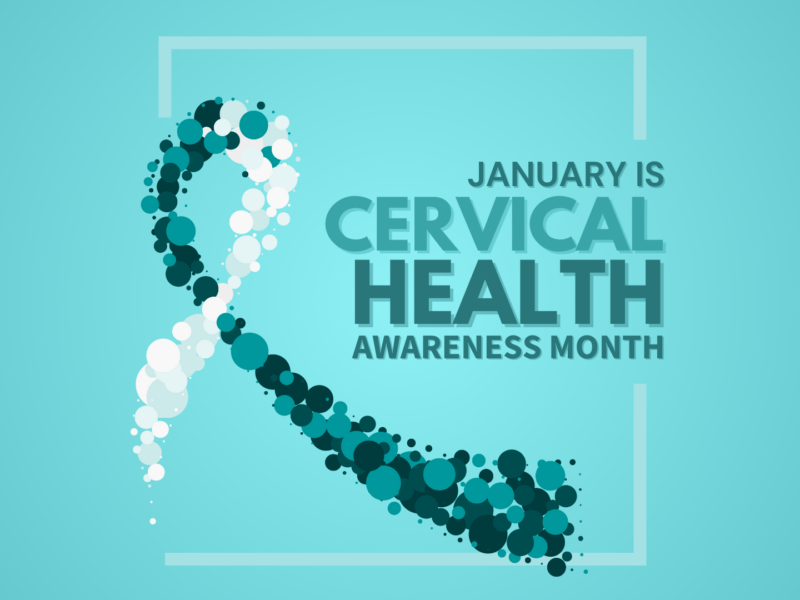January is Cervical Health Awareness Month, making it the ideal time to learn more about cervical health and the steps you can take to reduce your risk of cervical cancer.
Cervical cancer is one of the most preventable forms of cancer, thanks to early screening and the availability of the HPV vaccine. At Northwest Women’s Clinic, we are dedicated to empowering our patients with the knowledge and tools you need to stay healthy.
Let’s explore what you need to know about cervical health and how you can protect yourself from cervical cancer.

What is Cervical Cancer?
Cervical cancer occurs when abnormal cells on the cervix grow uncontrollably. The cervix is the lower part of the uterus that connects to the vagina. Most cases of cervical cancer are caused by the human papillomavirus (HPV), a common sexually transmitted infection.
While HPV infections are common, most infections clear up on their own. However, when the virus persists, it can cause changes in cervical cells that may lead to cancer if not detected and treated early.
Types of Cervical Cancer
There are two main types of cervical cancer:
- Squamous Cell Carcinoma: The most common type, developing in the cells lining the outer part of the cervix.
- Adenocarcinoma: This type starts in the glandular cells of the cervix.
Both types can be detected early through routine screenings.
Risk Factors for Cervical Cancer
Certain factors can increase your risk of developing cervical cancer:
- HPV Infection: The primary cause of cervical cancer.
- Smoking: Tobacco use can increase your risk.
- Weakened Immune System: Conditions that weaken the immune system, such as HIV, can make it harder to fight off HPV infections.
How to Prevent Cervical Cancer
The good news is that cervical cancer is highly preventable through regular screenings, vaccination, and healthy lifestyle choices. Here’s how you can take steps to protect yourself:
1. Get Regular Pap Smears
A Pap smear (or Pap test) is one of the most effective ways to detect abnormal cervical cells early. During a Pap smear, your healthcare provider collects cells from your cervix to check for any changes that could lead to cancer.
When to Get a Pap Smear:
- Women should begin Pap smear screenings at age 21, regardless of sexual activity.
- From ages 21 to 29, it is recommended to have a Pap test every two years.
- Women aged 30 to 65 should have a Pap test combined with an HPV test every five years or a Pap test alone every three years.
In some cases, more frequent screenings might be necessary. Be sure to discuss your screening schedule with your provider during your annual exam to find out how often you should have a Pap test.
If abnormal cells are detected, your provider will discuss follow-up care to prevent them from progressing to cancer.
2. Get the HPV Vaccine
The HPV vaccine is a powerful tool in preventing cervical cancer. It protects against the types of HPV that most commonly cause cervical, vaginal, and vulvar cancers.
Who Should Get the HPV Vaccine:
- The vaccine is recommended for boys and girls starting at age 9 and can be given up to age 45.
- Ideally, the vaccine is administered before individuals become sexually active to provide the best protection.
Even if you’ve already been exposed to HPV, the vaccine can still provide protection against other strains of the virus.
3. Practice Safe Sex
Since HPV is a sexually transmitted infection, practicing safe sex can help reduce your risk of contracting the virus. This includes using condoms and limiting your number of sexual partners.
4. Don’t Smoke
Smoking weakens your immune system, making it harder for your body to fight off infections like HPV. Quitting smoking can improve your overall health and reduce your risk of cervical cancer.
Signs and Symptoms of Cervical Cancer
In its early stages, cervical cancer may not cause any noticeable symptoms. That’s why regular screenings are essential. As the disease progresses, symptoms may include:
- Abnormal vaginal bleeding (between periods, after intercourse, or after menopause)
- Unusual vaginal discharge
- Pain during intercourse
- Pelvic pain
If you experience any of these symptoms, it’s important to schedule an appointment with your healthcare provider as soon as possible.
What Northwest Women’s Clinic Offers for Cervical Health
At Northwest Women’s Clinic, we are committed to providing comprehensive care to help our patients maintain their cervical health. Our services include:
- Pap Smear Screenings: Routine screenings to detect abnormal cervical cells early.
- HPV Testing: Combined with Pap tests to identify high-risk HPV strains.
- HPV Vaccination: Protecting patients from the most common cancer-causing strains of HPV.
- Evaluation of Abnormal PAP Smears: Colposcopy and cervical biopsy
- Treatment of Abnormal Cervical Cells: LEEP procedure or cryotherapy
- Counseling and Education: Providing patients with the information they need to make informed decisions about their cervical health.
Take Action for Your Health
Cervical cancer is one of the most preventable forms of cancer, but it requires taking proactive steps to protect yourself. This January, for Cervical Health Awareness Month, make a commitment to your health by scheduling a Pap smear, getting the HPV vaccine, or talking to your healthcare provider about your risk factors.
At Northwest Women’s Clinic, we’re here to support you every step of the way. Contact us today to schedule an appointment and take control of your cervical health.
 Maternal Health Awareness Day: How to Advocate for Your Health
Maternal Health Awareness Day: How to Advocate for Your Health